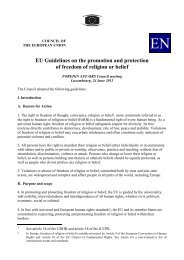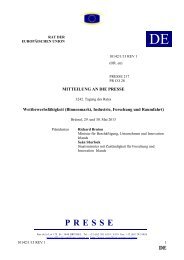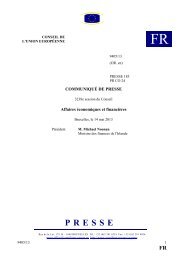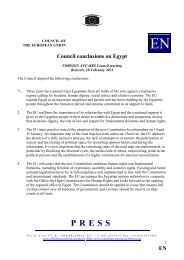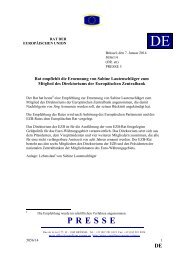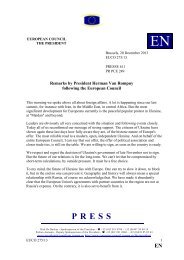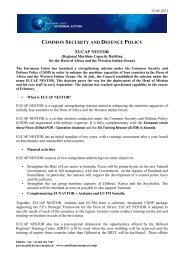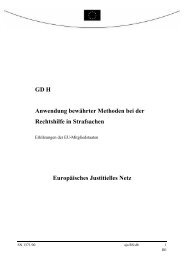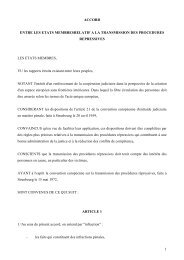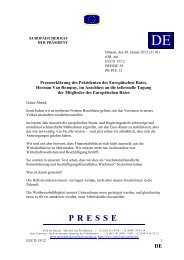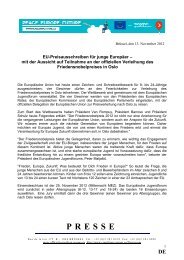Herman Van Rompuy President of the European Council ... - Europa
Herman Van Rompuy President of the European Council ... - Europa
Herman Van Rompuy President of the European Council ... - Europa
You also want an ePaper? Increase the reach of your titles
YUMPU automatically turns print PDFs into web optimized ePapers that Google loves.
EUROPEA COUCIL<br />
THE PRESIDET<br />
EN<br />
Brussels, 29 October 2013<br />
EUCO 215/13<br />
PRESSE 448<br />
PR PCE 193<br />
Speech by <strong>President</strong> <strong>of</strong> <strong>the</strong> <strong>European</strong> <strong>Council</strong><br />
<strong>Herman</strong> <strong>Van</strong> <strong>Rompuy</strong>, at <strong>the</strong> Gala dinner on <strong>the</strong> occasion <strong>of</strong> <strong>the</strong><br />
50th anniversary <strong>of</strong> <strong>the</strong> <strong>European</strong> Saving Banks Group<br />
It is a pleasure to be joining you this evening. Let me start by congratulating your<br />
organisation, <strong>the</strong> <strong>European</strong> Savings Banks Group, on your 50th anniversary. I consider all<br />
younger than I as young! So your organisation is really young. All older than I belong to<br />
<strong>the</strong> old age.<br />
Of course savings banks have been around much longer. Their original objective was to<br />
provide easily accessible savings products to all strata <strong>of</strong> <strong>the</strong> population. In some countries,<br />
savings banks were created on public initiative, while in o<strong>the</strong>rs, socially committed<br />
individuals created foundations to put in place <strong>the</strong> necessary infrastructure. A key idea was<br />
always to be close to citizens and to value every penny: because toge<strong>the</strong>r <strong>the</strong>se many<br />
pennies can make a difference and provide valuable services: to borrowers and to savers.<br />
The financial world has <strong>of</strong> course changed considerably since <strong>the</strong>n; financial innovation<br />
and increased financial integration in Europe, notably in <strong>the</strong> context <strong>of</strong> <strong>the</strong> Single Currency<br />
has created new challenges, for you and your members, but also for us policymakers. The<br />
sovereign debt crisis was <strong>of</strong> course <strong>the</strong> biggest <strong>of</strong> all!<br />
The intensity <strong>of</strong> <strong>the</strong> crisis necessitated path-breaking measures. These were outlined in <strong>the</strong><br />
four presidents report. Member States lived up to <strong>the</strong> challenge: we are now moving<br />
towards a fully-fledged banking union.<br />
P R E S S<br />
Dirk De Backer - Spokesperson <strong>of</strong> <strong>the</strong> <strong>President</strong> - ( +32 (0)2 281 9768 - +32 (0)497 59 99 19<br />
Preben Aamann - Deputy Spokesperson <strong>of</strong> <strong>the</strong> <strong>President</strong> - ( +32 (0)2 281 2060 - +32 (0)476 85 05 43<br />
press.president@consilium.europa.eu http://www.european-council.europa.eu/<strong>the</strong>-president<br />
EUCO 215/13 1<br />
E
This is not a coincidence. After all, <strong>the</strong> sovereign debt crisis was preceded by a severe<br />
banking crisis. Still, some banks wea<strong>the</strong>red <strong>the</strong> storm <strong>of</strong> <strong>the</strong> crisis relatively better than<br />
o<strong>the</strong>rs. A business model <strong>of</strong> collecting customer deposits to finance company investments<br />
can indeed be more robust. In Germany, for example, despite <strong>the</strong> sharp slowdown, savings<br />
banks expanded new business with companies by nearly 5 % in 2012. But not all savings<br />
banks did well. Instead, what we learned from <strong>the</strong> crisis was- irrespective <strong>of</strong> <strong>the</strong> business<br />
model - <strong>the</strong> importance <strong>of</strong> good risk management and good supervision. Indeed, since<br />
2011, EU banks have been making good progress in balance-sheet repair. The Tier One<br />
Common Capital Ratio for <strong>the</strong> largest EU banks stood at 11.9% at June 2013, against<br />
11.1% for <strong>the</strong> largest US banks. The agreement on <strong>the</strong> new capital requirements directive<br />
this summer will fur<strong>the</strong>r support this process and make our banking system even sounder<br />
in <strong>the</strong> years to come.<br />
We are also making good progress on <strong>the</strong> banking union, which will need to be<br />
comprehensive: to ensure a level playing field between banks, to avoid <strong>the</strong> creation <strong>of</strong><br />
pockets <strong>of</strong> vulnerability - because we know from <strong>the</strong> crisis that risk can emerge in all<br />
corners - and to protect taxpayers.<br />
The recent final adoption <strong>of</strong> <strong>the</strong> Single Supervisory Mechanism – placing all <strong>the</strong> banks <strong>of</strong><br />
participating member states under <strong>the</strong> direct or indirect supervision <strong>of</strong> <strong>the</strong> <strong>European</strong><br />
Central Bank in one year from now –, and last week's <strong>European</strong> <strong>Council</strong>, spelling out very<br />
concretely <strong>the</strong> timetable for <strong>the</strong> adoption <strong>of</strong> <strong>the</strong> deposit and bank resolution directives and<br />
<strong>the</strong> Single Resolution Mechanism regulation confirm clearly Member States' commitment<br />
to <strong>the</strong> banking union.<br />
The <strong>European</strong> <strong>Council</strong> <strong>of</strong> 24-25 October also stressed <strong>the</strong> importance <strong>of</strong> <strong>the</strong> comprehensive<br />
assessment by <strong>the</strong> <strong>European</strong> Central Bank <strong>of</strong> <strong>the</strong> balance sheet <strong>of</strong> around 130 banks, before<br />
it takes over <strong>the</strong>ir direct supervision.<br />
It is a challenging exercise, for all concerned- <strong>the</strong> banks, national authorities, <strong>the</strong> ECB. But<br />
it is a crucial one. The success <strong>of</strong> <strong>the</strong> comprehensive assessment will determine not just <strong>the</strong><br />
credibility and legitimacy <strong>of</strong> <strong>the</strong> Single Supervisory Mechanism, but it will also be central<br />
in helping kick-start financial intermediation across Europe, and restore normal lending<br />
conditions. Financial fragmentation continues to be a concern, especially in crisis<br />
countries. The comprehensive assessment will improve transparency in <strong>the</strong> banking sector,<br />
encourage repair where needed and build confidence, assuring all stakeholders that banks<br />
are fundamentally sound and trustworthy.<br />
EUCO 215/13 2<br />
E
But access to finance is a deeper problem and one that touches in particular small and<br />
medium-sized enterprises or SMEs. Given <strong>the</strong>ir importance in job creation in Europe, <strong>the</strong><br />
<strong>European</strong> <strong>Council</strong> has been rightly focusing on this segment <strong>of</strong> <strong>the</strong> corporate world. We<br />
know, for example, that <strong>the</strong> regulatory burden for <strong>the</strong>se firms needs to be manageable. This<br />
is why <strong>the</strong> <strong>European</strong> <strong>Council</strong> welcomed <strong>the</strong> Commission's communication on Regulatory<br />
Fitness. We also know about <strong>the</strong> many SMEs that need financing. The <strong>European</strong> <strong>Council</strong><br />
recognised this, calling on <strong>the</strong> Member States' Ministers and on <strong>the</strong> <strong>European</strong> Parliament to<br />
agree on a significant increase in EU support through structural funds in <strong>the</strong> period 2014-<br />
2020. The <strong>European</strong> Investment Bank, <strong>the</strong> long term financing vehicle <strong>of</strong> <strong>the</strong> Union, will<br />
play a key role here in bridging <strong>the</strong> gap with <strong>the</strong> private sector.<br />
Again, this is crucial for countries where financing conditions are tight. But it is<br />
noteworthy that a shortage <strong>of</strong> innovative financial instruments and services also affects<br />
very successful, internationally and R&D-oriented mid-cap firms in all Member States.<br />
Many <strong>of</strong> <strong>the</strong>se firms lack venture capital or credit lines that support <strong>the</strong>ir international<br />
expansions. It is important that we overcome <strong>the</strong>se market gaps if our firms are to<br />
innovate, thrive and compete globally. Clearly, this should be food for thought for<br />
policymakers, but also for <strong>the</strong> financial services industry and trade bodies.<br />
In Conclusion, I would like you to take away three messages: thanks to <strong>the</strong> many reforms,<br />
including <strong>the</strong> banking union, <strong>the</strong> Euro Area is fundamentally a stronger place. The type <strong>of</strong><br />
crisis that we have seen is now, in my eyes, inconceivable. The current gradual recovery,<br />
however, needs to develop momentum. For that to happen, banks and especially savings<br />
banks need to keep playing, more than ever, <strong>the</strong> essential role in <strong>the</strong> economy that has been<br />
<strong>the</strong>irs since centuries. And finally, this crisis has shown that we need More Europe or at<br />
least a more integrated Eurozone. Not for <strong>the</strong> sake <strong>of</strong> ideology but out <strong>of</strong> necessity. Europe<br />
is a choice and an obligation at <strong>the</strong> same time!<br />
EUCO 215/13 3<br />
E



